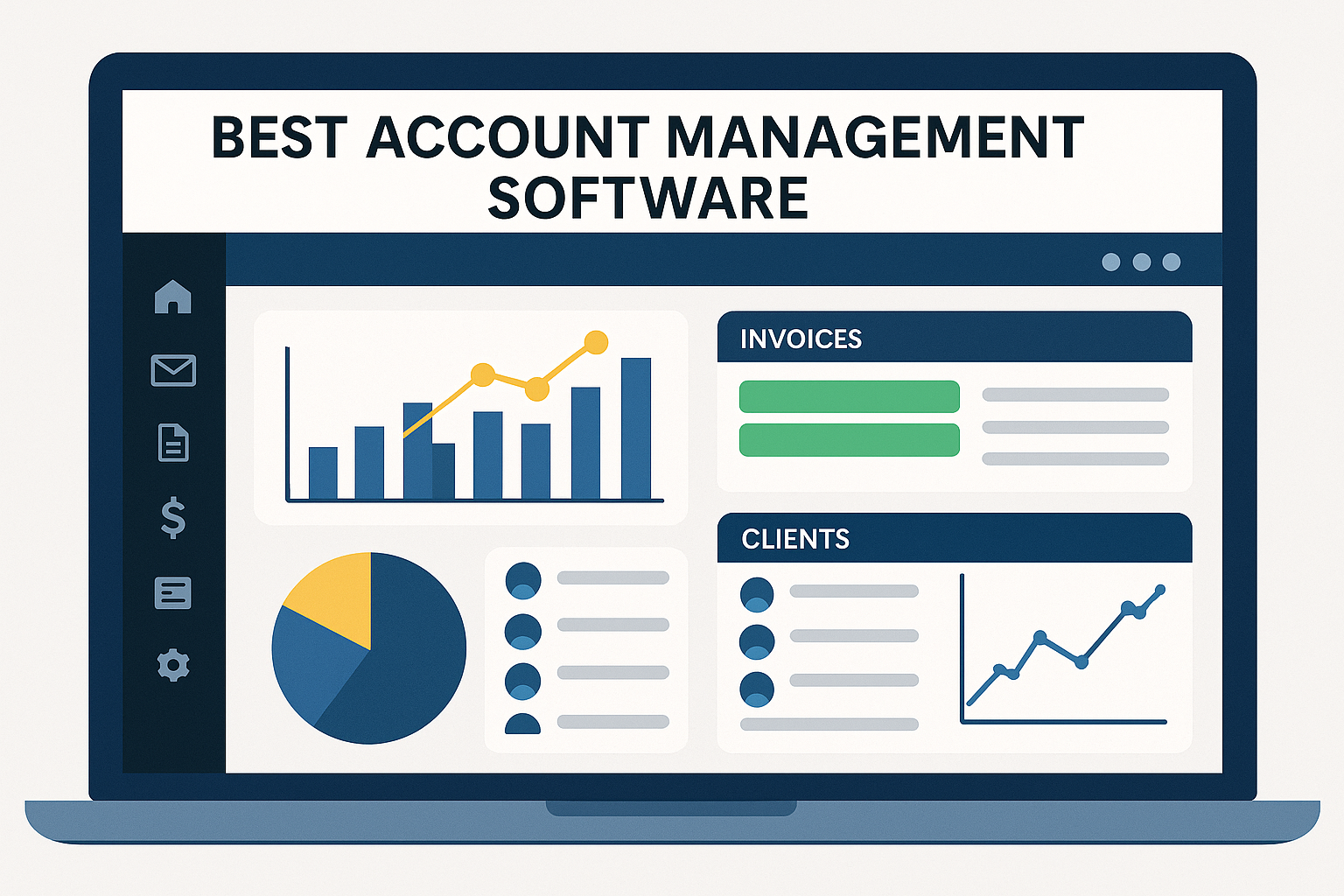In today’s fast-paced business environment, managing accounts effectively is more crucial than ever. Whether you're a small business owner, a freelancer, or part of a large enterprise, finding the best account management software can make a significant difference in your operational efficiency, productivity, and financial management.

But with so many options on the market, how do you choose the best one for your needs? In this blog, we’ll explore the top features of account management software, the benefits of using it, and our expert recommendations for the best solutions available in 2025.
What is Account Management Software?
Account management software helps businesses streamline and automate tasks related to customer and financial account management.
These tools provide functionalities like billing, invoicing, expense tracking, reporting, and client communication in one centralized platform.
The key goal is to simplify the management of accounts, reduce manual work, and improve accuracy and efficiency in managing customer relationships and financial transactions. Learn more about How to Find the URL of a Website
Why You Need the Best Account Management Software
Choosing the best account management software is essential for improving business efficiency. Below are some key benefits:
● Automation of Routine Tasks: Automates invoicing, payment reminders, and financial reporting, saving valuable time.
● Improved Accuracy: Reduces human error by automating calculations and maintaining accurate financial records.
● Enhanced Collaboration: Many software options offer team collaboration features, making it easier for team members to access client data and interact with clients.
● Data Security: Top software options offer advanced security features to ensure your financial and client data is safe.
● Comprehensive Reporting: Helps in creating detailed financial reports that assist in making informed business decisions.
● Customer Relationship Management (CRM): A robust account management solution integrates CRM functionalities to keep track of client interactions and preferences.
Key Features to Look for in the Best Account Management Software
When comparing different account management software options, look for these essential features:
● Ease of Use
● Automation Tools
● Multi-Platform Access
● Integrations
● Customer Support
● Scalability
Top Picks for the Best Account Management Software in 2025
Based on extensive research, here are our top picks for account management software that excel in all the critical areas:
Best for: Small to medium-sized businesses
QuickBooks is a powerhouse in accounting software. It offers an intuitive dashboard, automatic invoicing, easy expense tracking, and a wide range of reports.
QuickBooks integrates with numerous third-party applications and payment processors, making it a versatile option for businesses.
Pros:
● Automated invoicing and bill management
● Advanced reporting tools
● Strong customer support
● Cloud-based, accessible anywhere
Cons:
● May require additional integrations for advanced features
● A bit pricey for smaller businesses
Best for: Freelancers and service-based businesses
FreshBooks is known for its simplicity and ease of use. It’s perfect for freelancers, consultants, and small service businesses.
FreshBooks offers invoicing, time tracking, and project management tools in a single platform.
Pros:
● User-friendly interface
● Powerful invoicing features
● Time tracking and client communication tools
Cons:
● Limited accounting features compared to others
● Can become expensive as you scale
Best for: Growing businesses and enterprises
Xero offers a powerful set of accounting tools with features like bank reconciliation, invoicing, payroll, and financial reporting.
It’s known for its robust accounting capabilities and ease of use, even for those who aren't accountants.
Pros:
● Unlimited users for all plans
● Extensive integrations with third-party apps
● Real-time collaboration
Cons:
● Steeper learning curve for beginners
● Some advanced features are locked behind premium plans
4. Zoho Books
Best for: Businesses looking for affordability and functionality
Zoho Books is a cost-effective alternative that offers comprehensive accounting features like invoicing, expense tracking, and reporting.
It’s a great option for small to medium-sized businesses looking for an affordable yet powerful tool.
Pros:
● Affordable pricing plans
● Strong automation features
● Easy integration with Zoho’s suite of apps
Cons:
● Some advanced features require higher-tier plans
● Limited customer support options
5. Sage Business Cloud Accounting
Best for: SMEs and growing businesses
Sage offers a scalable solution suitable for growing businesses. It includes robust invoicing, financial reporting, and accounting features.
The software also has strong compliance tools, which are great for businesses that need to stay on top of tax regulations.
Pros:
● Multi-currency support
● Great for businesses with international clients
● Detailed financial reports
Cons:
● Some features can be difficult for beginners to navigate
● Expensive for smaller businesses
How to Choose the Best Account Management Software for Your Business

Choosing the right software depends on your specific business needs. Here are some questions to ask before making a decision:
● What is your business size?
● What features are most important?
● What’s your budget?
● Do you need integrations?
Conclusion
The best account management software for your business will depend on your needs, budget, and the features you prioritize.
From QuickBooks to Zoho Books, there are plenty of excellent options available in 2025 that can help streamline your accounting processes and boost efficiency.
No matter which software you choose, the right solution can help you stay on top of your finances, reduce errors, and improve the overall financial health of your business.
So, take the time to evaluate your options and pick the one that fits your needs best!
Frequently Asked Questions (FAQ)
1. What is account management software used for?
Account management software is designed to help businesses manage their financial operations and customer accounts more efficiently.
It typically includes tools for invoicing, billing, expense tracking, reporting, and customer relationship management (CRM).
2. Is there a difference between accounting software and account management software?
While the terms are often used interchangeably, accounting software primarily focuses on financial record-keeping, whereas account management software may also include CRM features and tools for managing customer interactions alongside financial tasks.
3. What type of businesses need account management software?
Any business that deals with clients, financial transactions, or invoicing can benefit from account management software. This includes freelancers, small to medium-sized businesses, startups, and large enterprises.
4. Is cloud-based account management software better than desktop-based?
Cloud-based software offers more flexibility, remote access, and real-time data updates, which are crucial in today’s business environment.
Desktop-based solutions may offer more control over data but lack the accessibility and collaboration features of cloud-based tools.
5. Which software is best for freelancers or solo entrepreneurs?
FreshBooks is widely recommended for freelancers due to its user-friendly interface, time tracking, and simple invoicing features.
6. Can account management software integrate with other tools?
Yes, most modern solutions offer integrations with CRM systems, payment gateways (like PayPal and Stripe), payroll systems, and popular tools like QuickBooks, Xero, or Zoho Books.
7. How much does account management software typically cost?
Pricing varies based on features and company size. Entry-level plans for small businesses can start around $15–$30 per month, while advanced enterprise-level software can cost hundreds per month depending on users and modules.
8. Is my data safe in cloud-based accounting software?
Yes, reputable providers like Xero, QuickBooks, and Sage use high-level encryption, secure data centers, and regular backups to protect your data.
9. Can I migrate my data from one software to another?
Most modern software platforms allow for data import/export or provide migration tools. It’s best to consult the provider or use their support services to ensure a smooth transition.
10. Do these tools support international currencies and taxes?
Yes, many tools like Sage Business Cloud Accounting and Xero support multi-currency features and are compliant with international tax regulations, making them ideal for businesses with global operations.

